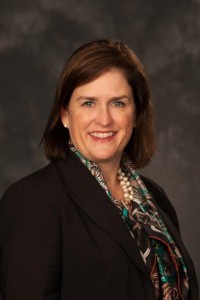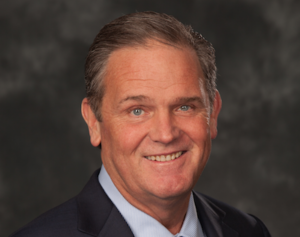 “If you see an issue impacting the business, jump in, even if it’s a problem you haven’t solved before,” says Citi Retail Services’ Molly McCombe. “Often, women put a higher burden on themselves to have specific content knowledge about an issue and wait to be asked to solve a problem, whereas men just jump in,” she says, adding that her own tendency to stick to safe projects might have limited her at the beginning of her career. “But now I have more confidence and will raise my hand even if I’m not the expert. There’s plenty of truth to the adage, ‘Fake it till you make it.’”
“If you see an issue impacting the business, jump in, even if it’s a problem you haven’t solved before,” says Citi Retail Services’ Molly McCombe. “Often, women put a higher burden on themselves to have specific content knowledge about an issue and wait to be asked to solve a problem, whereas men just jump in,” she says, adding that her own tendency to stick to safe projects might have limited her at the beginning of her career. “But now I have more confidence and will raise my hand even if I’m not the expert. There’s plenty of truth to the adage, ‘Fake it till you make it.’”
From Strategy to Leadership
After completing her undergraduate degree in finance at the Questrom School of Business at Boston University, McCombe began her career in a commercial credit training program where she was placed in a lending position, climbing the ladder to become a vice president. She began to consider other possibilities in the business world and honed in on management consulting, attracted by its opportunities to solve a variety of challenging business problems. Setting her sights on that career path, she reverse engineered what it would take to get there and realized a top-tier business school was a must.
After earning her M.B.A. from the J.L. Kellogg Graduate School of Management at Northwestern University, she joined McKinsey & Company and became a consultant for financial services firms, a role she found both fascinating and challenging. Eventually she realized that she was ready to move to an operational role, where she could “practice what she was preaching,” and took a strategic role in the credit card group at HSBC, where she held a variety of positions, including leading business development, digital marketing and product development. She joined Citi in 2011 as part of Citi Retail Services, the division responsible for providing credit cards and related services to stores such as The Home Depot, Macy’s, Best Buy and many more. In her CMO role she is responsible for all aspects of joint credit marketing and analytics between Citi and the retailers, from campaign development and management through execution and assessment, as well as leading Citi’s digital marketing, loyalty, and research groups.
One of the achievements she’s most proud of is making the transition from a strategist and advisor to a manager and operator. “It’s been a 180-degree turn. I love both jobs because they’re different and yet they inform one another,” she says. She enjoys the strategic side — working on thorny problems and helping the client see them through — and also appreciates the day-to-day aspects of leading geographically dispersed teams and tackling tactical and operational issues. “I am a better leader and manager because I’ve done both,” McCombe says.
Managing the marketing of credit card programs with leading retailers puts her in a front row seat to what’s new in both the banking and retailing industries, and she is fascinated by the changing ways that people approach shopping.
“Consumers are in the driver’s seat in how they interact with retailers now, because they can leverage so much information to make informed purchases,” she says. No longer is it just about finding product and price information online, but also considering peer reviews about products and sharing experiences.
“At the same time, consumers are increasingly open to building deeper relationships with retailers,” McCombe explains. “Part of the value we bring to retailers is our experience in this area. We’re using our understanding of consumer preferences to drive more relevant offers to our retailer’s customers and enhance market share for our retail partners.”
The Advantage of Being a Women
McCombe says that women can be discouraged when they don’t see as many women farther up the ladder, which will continue to be a deterrent until the payments industry can promote and retain women at multiple levels. “It’s a challenge to say ‘I’m passionate about this industry, and I’m going to jump in,’ when there aren’t many women on the upper rungs,” she says, citing a niece who just graduated from Northwestern University who had remarked on the lack of women in senior roles. But she advocates that young women view it instead as an incredibly relevant place for women since they are the primary decision makers in households on budgeting and how money is spent. “A savvy organization is going to want that experience and input, whether they’re evaluating their product offerings or their payment options. Since I started, there is a much greater appreciation for a woman’s perspective in this business, and the opportunities are endless.”
And as women do rise to leadership positions, she says they should be sure that they are still focused on growing, learning and taking on cross-functional roles to avoid being pigeonholed.
Grow Your Network to Grow Your Career
Along the way McCombe has appreciated the opportunity to mentor and grow other professionals throughout the years, both on the consulting and corporate side. “I have been able to create a strong network around the globe that is both professionally and personally rewarding.”
She encourages women to participate in programs at their workplace for both educational and networking benefits. “These are terrific forums for junior women who want to get to know senior women; it’s a way to demystify and humanize these senior leaders. When you build personal relationships, you find out they’re just like anyone else, and I found that very empowering.”
She finds that these connections often lead to informal mentoring relationships, the type that are grounded in commonality. “It’s so helpful to have an off-the-record sounding board, where you can talk about challenges and get input on how to handle them. Mentorship and connectivity is incredibly powerful and will help retain women,” she says.
A Rewarding Personal Life
Married to a hospitality professional who owns three restaurants, McCombe appreciates that it has gotten her connected to the Chicago dining scene and its farm-to-table movement.
And McCombe remains connected to her undergraduate alma mater — serving on the Dean’s Advisory Board at the Questrom School of Management at Boston University — for a very important reason: She was able to attend Boston University thanks to an academic scholarship, and now is committed to paying it forward by sponsoring a scholarship for undergraduate women studying finance and analytics. “It’s very gratifying to be able to give back to an institution that gave me my start, and to support the next generation of women business leaders,” she says.

 Leaders must always be conscious of the shadow they cast for their teams, says Bill Johnson, CEO of Citi Retail Services. “You can ‘talk the talk, but people watch you and your behavior, and what you do day in and day out is far more important than what you say. You should never ask anyone to do anything you wouldn’t do yourself, and you certainly should not behave in ways you wouldn’t want your team to emulate. The impression you leave behind is your shadow.”
Leaders must always be conscious of the shadow they cast for their teams, says Bill Johnson, CEO of Citi Retail Services. “You can ‘talk the talk, but people watch you and your behavior, and what you do day in and day out is far more important than what you say. You should never ask anyone to do anything you wouldn’t do yourself, and you certainly should not behave in ways you wouldn’t want your team to emulate. The impression you leave behind is your shadow.”